
Paavo Tapio Lipponen is a Finnish politician and former reporter. He was prime minister of Finland from 1995 to 2003, and chairman of the Social Democratic Party of Finland from 1993 to 2005. He also served as speaker of the Parliament of Finland from 2003 to 2007 and was his party's nominee in the 2012 Finnish presidential election but received only 6.7% of the votes, making it the biggest defeat the Social Democratic Party had ever received in Finnish presidential elections at the time. Lipponen is currently the oldest living former prime minister of Finland.
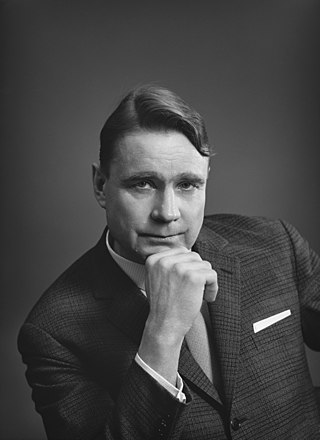
Mauno Henrik Koivisto was a Finnish politician who served as the ninth president of Finland from 1982 to 1994. He also served as the country's prime minister twice, from 1968 to 1970 and again from 1979 to 1982. He was also the first member of the Social Democratic Party to be elected as President of Finland.

Mäntyniemi is one of the three official residences of the President of Finland, besides the Presidential Palace and the summer residence Kultaranta. Mäntyniemi was finished in 1993. Four Finnish presidents have lived there: Mauno Koivisto, Martti Ahtisaari, Tarja Halonen, and the incumbent Sauli Niinistö.
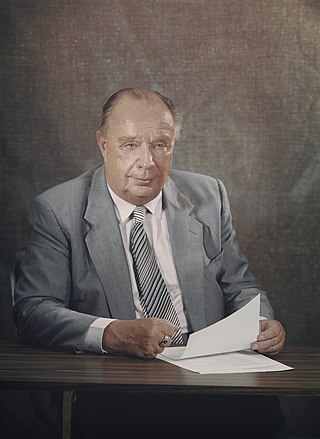
Veikko Emil Aleksander Vennamo was a Finnish politician. In 1959, he founded the Finnish Rural Party, which was succeeded by the True Finns in 1995. He had originally been the leader of a faction of the Agrarian League. When his opponent, Urho Kekkonen, was elected president of Finland, Vennamo broke off his Agrarian League affiliation. Vennamo was a member of Parliament in 1945–1962 and 1966–1987. He was also the director of the Agricultural ministry's Resettlement office in 1944–1959 and was responsible for the resettlement of the farmers evacuated from the ceded Karelia. Later he was a department director at the Board of Customs.
Parliamentary elections were held in Finland on 15 and 16 March 1970.
Parliamentary elections were held in Finland on 18 and 19 March 1979.
Parliamentary elections were held in Finland on 20 and 21 March 1983. The elections were widely regarded as a "protest election" because, contrary to expectations, the major parties with the exception of the Social Democratic Party (SDP) performed poorly; the Liberal People's Party (LKP) lost all its seats in the Eduskunta, while the Finnish Rural Party (SMP) more than doubled its seat tally and the Greens won seats for the first time. The SMP's success was credited, at least in part, to voter distaste for some mainstream parties because of political scandals; no significant policy differences emerged in the election campaign. The SDP won 57 seats, the best performance by a party since World War II.

Parliamentary elections were held in Finland on 17 March 1991, the first time a Finnish parliamentary election had been held on a single day. For the first time since 1962 the Social Democratic Party was displaced as the largest party in the Eduskunta, with the Centre Party winning 55 seats and forming the first centre-right, non-social democratic government since 1964, with Esko Aho as Prime Minister.
Lauri Ingman's second cabinet was the 11th Government of independent Finland, serving between 31 May 1924 – 31 March 1925. It was formed following the 1924 parliamentary elections between four parties—National Coalition Party, Agrarian Party, National Progressive Party and Swedish People's Party—and had a majority in the parliament during the first six months. Overall, the cabinet lasted 305 days in office.
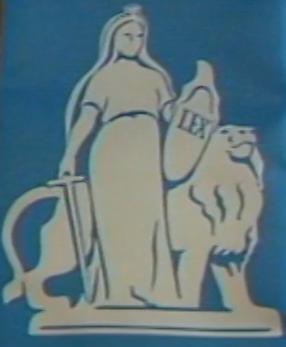
The Constitutional Right Party was an anticommunist political party in Finland. The party was founded in 1973 by the parliamentarian Master in Law Georg C. Ehrnrooth as an anticommunist split from the Swedish People's Party (SFP).

Two-stage presidential elections were held in Finland in January 1982. The public elected presidential electors to an electoral college on 17 and 18 January. They in turn elected the President. The result was a victory for Mauno Koivisto, the first member of the Social Democratic Party to be elevated to the country's highest post, and his election meant the full integration of Social Democrats into Finnish public life and an end to the postwar dominance of the Centre Party.
Teuvo Aura's first cabinet was a caretaker government of Finland, led by Teuvo Aura (lib.). The cabinet governed for two months, from 14 May 1970 to 15 July 1970 in the interregnum between Mauno Koivisto's first cabinet and Ahti Karjalainen's second cabinet. It did not produce a government platform.

Taimi Tellervo Koivisto is a Finnish politician and the former First Lady of Finland from 1982 to 1994. Koivisto is the widow of the 9th President of Finland Mauno Koivisto and a former member of the Finnish parliament, representing the Social Democratic Party of Finland.
The second cabinet of Mauno Koivisto was the 61st government of Finland, which was in office from 26 May 1979 to 19 February 1982. It was a majority government composed of a coalition between the Social Democrats, the Centre Party, the Swedish People’s Party, and the People’s Democratic League. The government was dissolved on 26 January 1982 due to Prime Minister Mauno Koivisto being elected the 9th President of Finland.

Margit Marjatta Margareetta Eskman was a Finnish politician. She was a member of the Parliament of Finland from 1966 to 1975, representing Turku Province North as a member of the Social Democratic Party. She was the Second Minister of Finance from February to May 1972, the first woman to hold that position. Eskman later served as the director-general of Finland's national social security agency and the National Board of Social Welfare.
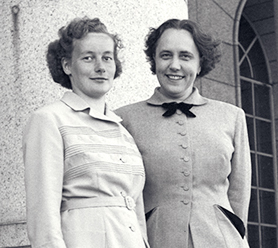
Anna-Liisa Korpinen was a Finnish politician. She represented Lapland in the Parliament of Finland as a member of the Finnish People's Democratic League from 1951 to 1974. In 1968, she was appointed as Minister of Social Affairs by prime minister Mauno Koivisto, and was the Minister of Social Affairs and Health in prime minister Ahti Karjalainen's government from 1970 to 1971.
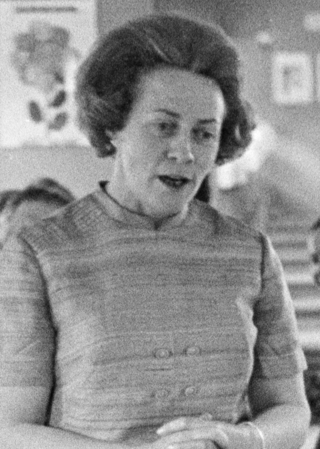
Katri-Helena Eskelinen was a Finnish politician. She represented Kuopio in the Parliament of Finland from 1966 to 1987 as a member of the Centre Party. She was also the second minister of social affairs and health in the governments of Prime Ministers Ahti Karjalainen and Mauno Koivisto.

Ilmi Orvokki Kangas was a Finnish politician. She represented Vaasa in the Parliament of Finland from 1970 to 1983 as a member of the Centre Party. From September 1976 to May 1977, she was Finland's second minister of social affairs and health, appointed by Prime Minister Martti Miettunen.

Sinikka Marjatta Luja-Penttilä was a Finnish politician and writer. She represented Uusimaa in the Parliament of Finland from 1966 to 1983 as a member of the Social Democratic Party, and was the minister of social affairs and health from 1979 to 1982.
Taisto Tähkämaa is a Finnish Centre Party politician who served at the Parliament and held various cabinet posts, including minister of defense and minister of agriculture and forestry in the 1970s and 1980s.














